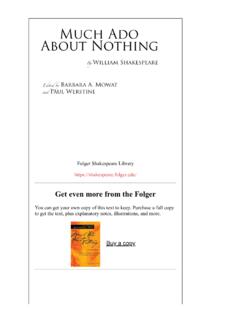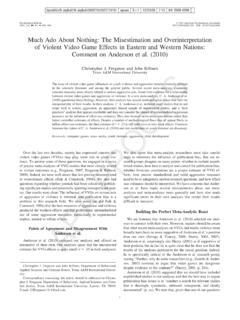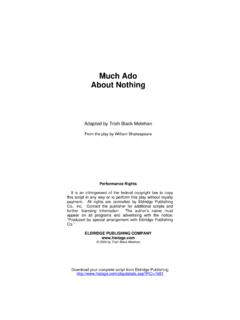Transcription of The Lebanese Parliamentary Elections of 2018: Much Ado ...
1 FOKUS | 4/20181 Peter Nassif On 6 May 2018, Lebanon went to the polls to elect a new parliament for the first time in nine years. These Elections stand out for the largest reform in voting laws in Lebanese history, the influence of regional tensions, but also a civil society challen-ging the old guard. After much anticipa-tion, the general Elections changed less the political landscape than many people had hoped. The results demonstrated that Lebanese voters and political parties are still far away from running and voting on policy-based solutions to tackle the socio-economic challenges facing the country. Since their last election in 2009, the par-liament had extended its mandate three times before agreeing to hold Elections in 2018.
2 The delays were so extensive that the last parliament was elected in a diffe-rent regional context before the Arab Spring and the Syrian War. Revolutions have reshaped Tunisia and Egypt, while Syria, Iraq and Yemen plunged into gru-esome wars and experienced the rise and fall of the Islamic State. In recent months, the Trump administration, Israel and Saudi Arabia have been increasingly escalating their campaign against Iran, with the US withdrawing from the Iran Deal (JCPOA)1 two days after the Lebanese Elections . Internally, Lebanon is closely affected by neighboring Syria where the war has pro-duced an outflow of million refugees, with around million refugees living in Lebanon,2 rendering it the country with the highest count of refugees per capita.
3 Interestingly, the war and refugee crisis did not play a large role during election campaigns partly because of the lack of feasible solutions and partly because of a tacit agreement among parties to avoid this path. An important aspect was the buildup of major international conferences where Lebanon wanted to give a positi-ve image and avoid populist campaign rhetoric: On 24 and 25 April 2018, the Brussels II conference was held to secure humanitarian support for Syrian refugees as well as political support for neighboring host More important was the CEDRE4 donor conference that was held in Paris on 6 April, where 11 billion USD in credits and grants were pledged to Le-banon during election season a country with a gross public debt of almost 80 billi-on USD5 and the fifth-highest debt-to-GDP ratio Peculiar Political SystemLebanon is a consociational democracy that relies on a system of proportional sectarian Based on a late Ottoman power-sharing formula,8 each of the 18 acknowledged religious sects in Lebanon enjoy access to the government.
4 The 128 seats in Parliament are distributed between sects in accordance with their size of population. After Lebanon s inde-pendence in 1943, a power-sharing deal based on the census of 1936 gave the lar-gest sect (Christian Maronite) the Presiden-cy, the second largest group (Sunni Islam) the Prime Minister, and the third (Shia Is-lam) the Speaker of Parliament. No official census has taken place since 1936, but the Taif Agreement of 1989 that ended the Le-banese Civil War (1975-1990) strengthened the role of the Prime Minister and Speaker of Parliament in relation to the Presidency. Most militias were disarmed after the war, but Syria continued to occupy Lebanon for another 15 years, effectively controlling the country through political proxies and its military force.
5 This included the support of Hezbollah, keeping the group in arms and shielded from accountability. Still, virtually all major political parties today had a military wing during the war. After commanding militias (or the army) during the war, today s party leaders maintain their power through a system of patro-nage and and Security ChallengesThe parliament s Elections were postponed in 2013 and 2014 because of security con cerns. During the time, the Syrian War was raging in the Lebanese -Syrian border region, while the rise of ISIS and frequent car bombings in Hezbollah s southern Beirut neighborhoods led to a general sense of insecurity. The Syrian government was losing ground and the Lebanese Shiite Hezbollah militia had joined the conflict in 2012 to fight alongside the regime.
6 It took until mid-2014 for the Lebanese and Syrian army with Hezbollah to secure the border region, although pockets of ISIS remained in Lebanon until summer 2017. Security is not the only concern in Leba-non: the incapability of the Lebanese government to agree on basic infrastruc-ture projects led to major crisis in the summer of 2015. Beirut s main landfill was closed without having an alternative at hand, because political actors could not agree on a plan that would benefit them all. Organized waste management became impossible for the next eight months, during which municipalities had to store waste within the city, often in residential neighborhoods if garbage was collec-ted at all. The notorious corruption and incompetence of the Lebanese political system sparked protests in the summer of 2015 that grew from the garbage crisis to overall contempt for the government and political system.
7 The protest movement was able to mobilize and quickly organize the civil society, surprising the established political class. This became apparent in the municipal Elections of May 2016, where the civil society that formed in the previ-ous summer earned considerable votes in several districts particularly Beirut, where they won 40% on specific seats. Due to the majority-based electoral system at the time, the votes where not enough to win any seats, but they demonstrated that the civil society was a force to be reckoned Lebanese Parliamentary Elections of 2018: much Ado about nothing ? FOKUS | 4/20182 The Lebanese Parliamentary Elections of 2018 interests. Instead, the move weakened the KSA s position in Lebanon and with it that of its ally Hariri, while Hezbollah and President Aoun were praised for keeping calm, uniting the country and solving the crisis diplomatically.
8 Changing the Electoral LawBefore 2018, Elections in Lebanon were based on an old majority-based electoral law that followed a winner-takes-all logic. In an attempt to avoid the deadlock produced by previous Elections , the law was changed to a more proportional voting system. The Lebanese parties primarily repre-sent religious sects and family relations, although minor ideological differences may still occur, particularly within the sects. Hence, parties very rarely engage their constituents on the level of ideology or political programs. The pronounced sectarian identity of Lebanese voters and party loyalty is passed on within fami-lies and over generations. Shifts in voter alignment are unlikely because parties focus on religious rhetoric, clientelism and family affiliations instead of a program-matic platform.
9 This would make it nearly impossible for political parties to escape the deadlock in the political system by changing their programmatic orientation. Instead, the system itself needs to be chan-ged, thus parties agreed on changing the voting system. In 2017, a consensus was reached that opened the Elections to the Lebanese diaspora and switched the voting from a majority to a proportional system. However, it kept in place the sectarian restrictions and made use of serious manipulations regarding the design of the voting districts as well as defining the exact number of seats and their sects. The law s requirement for candidates to run in fixed lists was regarded as helpful to push parties to agree on a coherent policy that would bring them together in the Instead, fixed lists lead parties to abandon political platforms more than ever, in favor of combining parties and candidates to form lists that accumulate a maximum of votes.
10 Established parties joined lists with allies and rivals in some districts, while running against them in other areas. Other implications include: First, indepen-dents and popular candidates could no longer rely on their own weight but rather had to attach their candidacy to strong lists that expected to win seats. Second, because the system no longer follows a winner-takes-all approach, the seats of each sect gained considerable weight, even in areas that were traditionally seen as strongholds of a particular sect and their respective parties. Third, the diaspora vote opened the Elections to a completely new ecosystem of Lebanese nationals. Since Lebanese citizens living abroad are believed to amount to roughly the same size as inside Lebanon, this may have considerable impact if enough diaspo-ra Lebanese choose to take part in the 2018 Election Outcome After nine years without Elections , there was a general mood of excitement, and although the candidate registration was not cheap (ca.)









